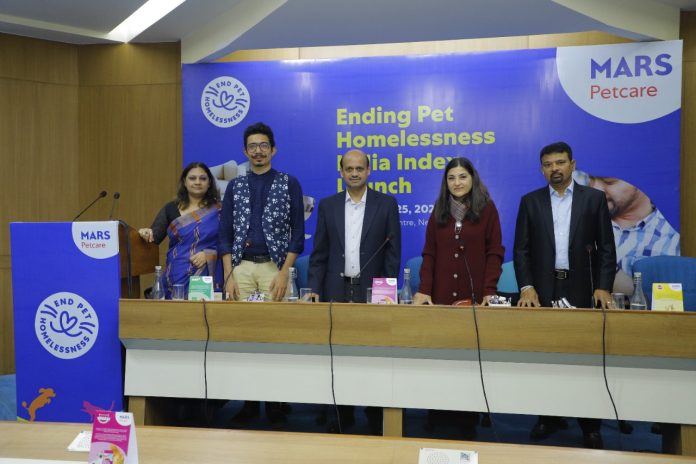@ Vikash Sharma | Sr Journalist
Delhi: Mars Petcare India today, in partnership with an advisory board of leading animal welfare experts, released the first ever State of Pet Homelessness Index at the Habitat Centre, New Delhi. This is the first methodological measure of pet homelessness, identifying contributing factors in India.
The Index is derived from data from more than 200 global and local sources across nine countries, supplemented by new quantitative research based on attitudinal data.
There are three pillars that frame the Index and look at various factors influencing pet homelessness. These are all pets wanted, cared for and welcome, that encompass the various aspects of stray dog & cat management:
All Pets Wanted
• Evaluating reproduction control programs (spay/neuter and responsible breeding practices), roaming and stray populations, disease prevention, and cultural attitudes towards pet ownership
India:
• There is a relatively low amount of companion animal sterilization and vaccination in India
• Scored low on Proactive partners enabling responsible breeding practices and enabling owners’ skills and knowledge
All Pets Cared For
• Evaluating rates of shelter adoption and pet ownership, assessing shelter pain points, and access to veterinary care
India:
• Low number of veterinarians per capita, specifically small animal vets per capita as well
• High percentage of diseases in dogs in India, including rabies, TVT and fleas/ticks
All Pets Welcome
• Evaluating barriers to pet ownership/adoption and responsible pet ownership, as well as government support and policy
India:
• The cost of owning a pet is relatively expensive in India
• The total market value of the pet care industry in India is low, though it is growing rapidly
• There is need for stronger enforcement of animal welfare standards and law enforcement against cruelty to animals, especially at local levels of government
The Index revealed that an estimated 80 million homeless cats and dogs in India are living in shelters or on the streets. Despite an increase in pet ownership during the COVID-19 pandemic, India figures show that during the lockdown two-thirds of pet parents had a newfound appreciation for their pets and six in 10 people felt encouraged to adopt one. India’s data highlighted several challenges: housing limitations, financial limitations, practical barriers and lack of behavioural awareness about stray pets, leading to people buying breed dogs and cats instead of adopting from shelters. In addition, relinquishment levels are higher in India than on a global level with half (50%) of current and previous owners stating they have relinquished a pet in the past, compared to 28% on a global level. About 34% said they have abandoned a dog on the streets, and 32% have abandoned a cat. This data informed an overall index tally of 2.4 out of 10 for India.
Ganesh Ramani, Managing Director, Mars Petcare India, said: “Until now, there was no way to measure and track the scale of the issue of homeless stray dogs and cats across the world and in India. That’s why we are proud to share the State of Pet Homelessness Index, that can provide a basis to measure, over time, the impact of the collective work being done. The EPH Index is a call to action, we know this is just a beginning and we welcome partnerships with government, NGO and individual stakeholders who want to ensure all companion animals are wanted, cared for and welcome.”
As per the EPH Index data for India, 82% of dogs in India are considered street dogs, 53% of people feel street dogs present a danger to people, 65% of people fear a dog bite, and 82% of people believe that street dogs should be removed and put in shelters, out of the streets. Education around street dogs can play a large role in reducing stigmas and driving a culture of ownership. Vaccinations can reduce animal-human conflict and effective sterlization can reduce the number of strays on the streets.
“As an organization, we have been working to address pet homelessness and to create a better world for pets. We’ve been implementing a wide range of programmes which brings people together to create a larger impact. Our programs address responsible pet ownership, better cities for pets, public sensitization towards cruelty to animals, thought leadership seminars, stray feeding through NGOs and adoption”, Ganesh added.
Shashanka Ala, Deputy Commissioner, Karol Bagh Zone, Municipal Corporation of Delhi, said: “Pet homelessness is a challenge for urban centres like Delhi. It came to fore even more due to the pandemic and the lockdown. The need for a solution is more important than ever now. The State of Pet Homelessness Index is a step in the right direction. I am glad that Mars Petcare conducted the study as the data will drive informed stray welfare initiatives. The Municipal Corporation of Delhi will support and associate with initiatives that will help reduce pet homelessness.”
There is a clear and desperate need for a more coordinated effort to address the challenge of pet homelessness in India. As the leader in the pet food industry, MARS Petcare is playing a key role in helping address the issue of pet homelessness by its various programs, partnerships, nutrition for strays and advocacy for ownership. Policy makers are expected to help address and reduce stray populations through sterilization programs and NGOs and shelters have an opportunity to further programs for vaccination, sterilization, rescue and adoption. Foster families can play a huge role in rehoming, providing temporary homes for lost/injured pets, and also taking the burden off the few, resource starved shelters in India. The EPH Index aims to bring all forces together to create maximum impact through these efforts.
To find out more about the State of Pet Homelessness Index and existing programmes addressing pet homelessness, please visit: endpethomelessness.com. You can also follow the conversation on social media using #EndPetHomelessness.

















